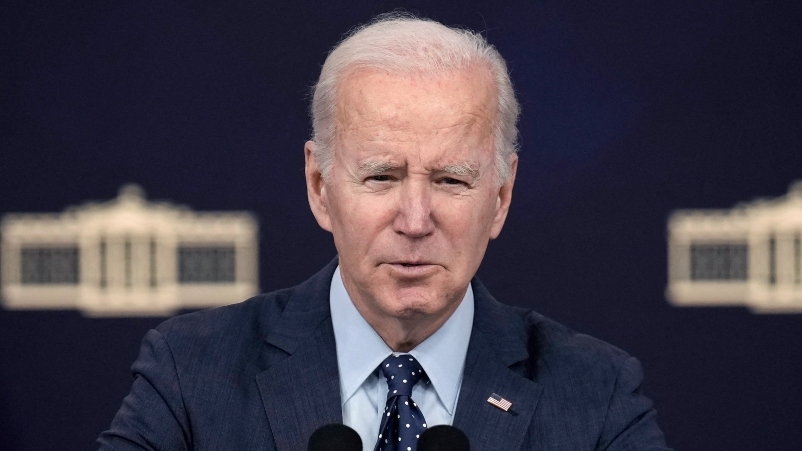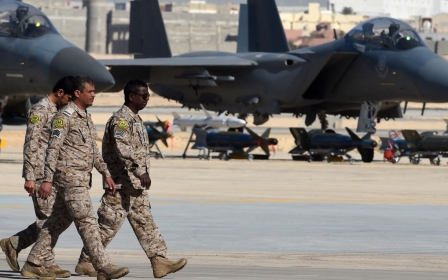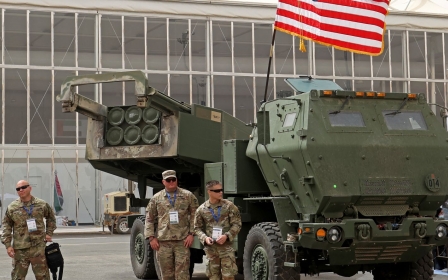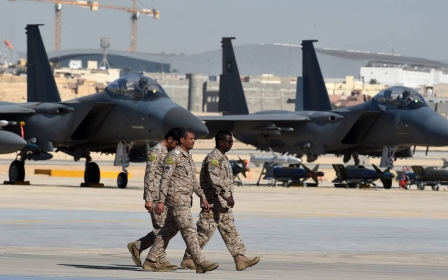US launches overhaul of arms export policy with new human rights emphasis

US President Joe Biden's administration has released a long-awaited overhaul of its arms export policy, which it says will have an increased emphasis on human rights, as rights groups launch a project to pressure the administration to alter its arms policies and increase transparency measures.
The new Commercial Arms Transfer (CAT) policy covers a review of security assistance, government-to-government weapons transfers, and licensed commercial sales of US-origin military equipment and services overseen by the State Department as well as the Defence and Commerce Departments.
New MEE newsletter: Jerusalem Dispatch
Sign up to get the latest insights and analysis on Israel-Palestine, alongside Turkey Unpacked and other MEE newsletters
One change is on how the policy addresses the possibility that arms from Washington could be used for major human rights violations, State Department officials said.
Under the new policy, a weapons transfer will not be approved if the State Department assesses the arms "more likely than not" will be used to commit or facilitate genocide, crimes against humanity, breaches of the Geneva Conventions, or serious violations of international law.
The previous policy said that such transfers would be authorised only when the US had "actual knowledge" that weapons would be used in such violations.
"We are looking at a policy of prevention when there is a risk of violation of human rights," one official told Reuters. The policy also allows deals to be cancelled, if rights violations are documented after they are announced.
The change could also affect exports of smaller weapons, such as assault rifles, which could be used against domestic populations. Some of this has been under the umbrella of the Commerce Department, since the administration of former President Donald Trump.
The new CAT policy has been in development for months. Reuters previously reported in 2021 that the Biden administration was considering a policy shift to emphasise human rights.
'Piecemeal reforms'
The new policy comes as 10 rights groups came together on Thursday to launch a new initiative called the Arms Sales Accountability Project, which seeks to pressure the Biden administration into altering its arms policies to increase accountability and transparency measures.
"The impetus behind the campaign was a real frustration with a lack of systemic reform to the very broken arms trade," Ari Tolany, US programme manager at the Center for Civilans in Conflict, told The Intercept.
"When you have decades of evidence of regimes using US weapons to silence dissent and protest or when you watch the government keep selling weapons to forces who use US bombs to strike schools and hospitals, it’s clear that piecemeal reforms aren’t enough."
The Biden administration has claimed that it has placed human rights at the centre of its foreign policy. However, over the past several years, rights advocates have raised concerns over its weapons sales to a number of countries, including Saudi Arabia and the United Arab Emirates, for its role in the Yemen war, as well as Egypt for human rights violations.
Biden announced in February 2021 that the US would end support for offensive operations in the Saudi-led war in Yemen, but lawmakers raised questions about what constituted an "offensive" or "defensive" weapon. Since then, the administration has continued to greenlight sales to Riyadh and Abu Dhabi.
And in December, when US Senator Bernie Sanders tried to place a vote on the War Powers Resolution that would be a definitive end to American support for the Saudi-led coalition's war efforts in Yemen, the White House stepped in threatening a veto. Sanders ultimately pulled the vote.
The US is, by far, the world's largest arms exporter, selling some $150bn in weapons, services and training a year.
The US Arms Export Control Act requires that Congress be notified of major foreign arms sales, and an informal review process allows the Democratic and Republican leaders of foreign affairs committees to vet such agreements.
However, the US also approves arms sales that fall below thresholds that would trigger a notification to Congress. A 2020 inspector general’s report found that there were "4,221 below-threshold arms transfers involving Saudi Arabia and the United Arab Emirates" since 2017, which had a total value of more than $11bn.
Middle East Eye delivers independent and unrivalled coverage and analysis of the Middle East, North Africa and beyond. To learn more about republishing this content and the associated fees, please fill out this form. More about MEE can be found here.





